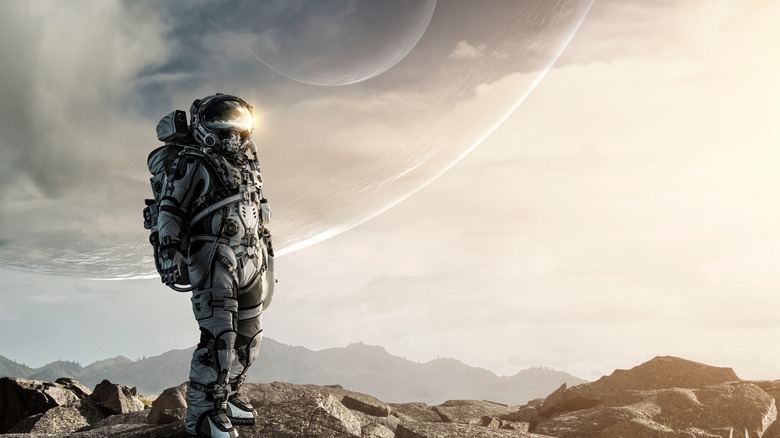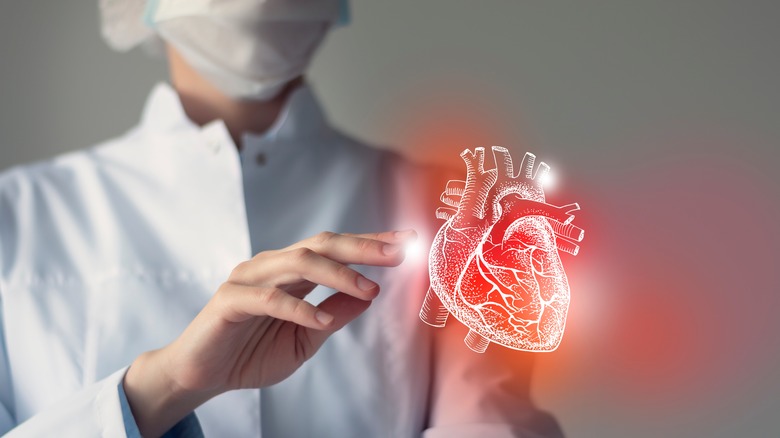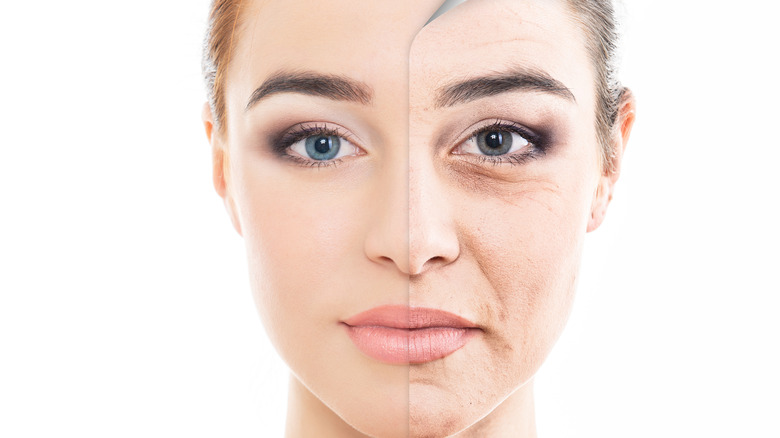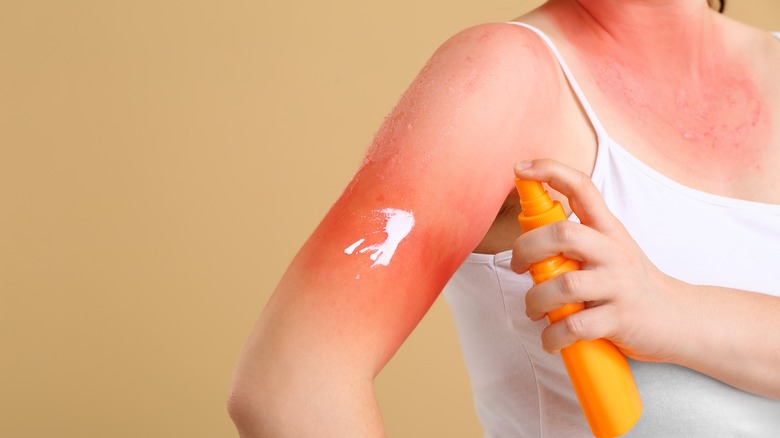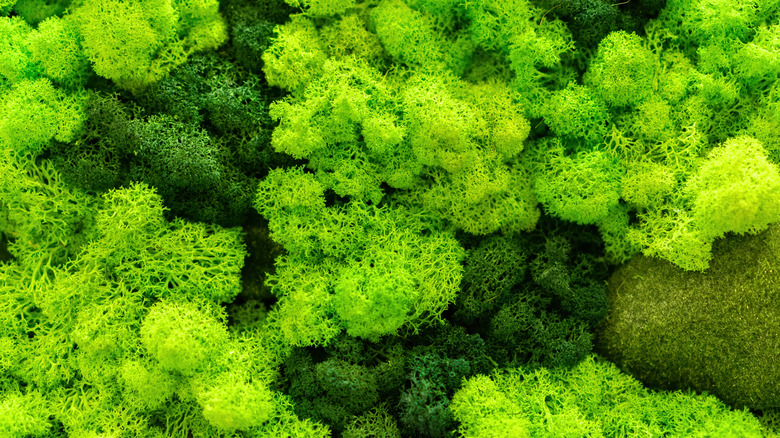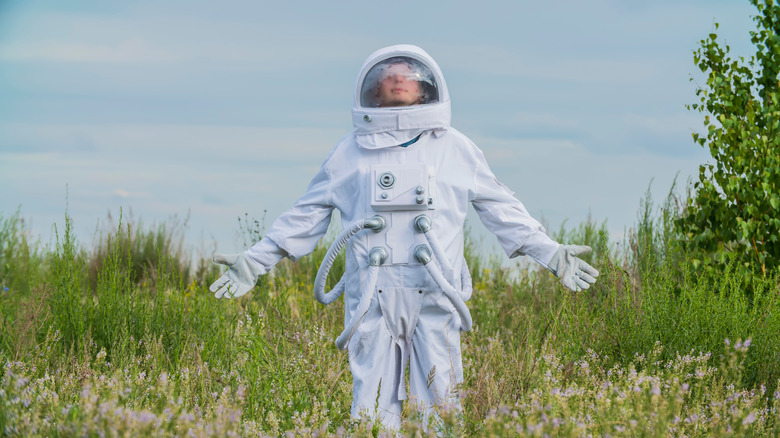What Happens To Your Body When You Travel To And Live On Mars?
Some say men are from Mars, but science suggests we do not belong there even as visitors. Space travel exhibits harmful effects on the human body, and life in microgravity is tough on the bones (via BBC News). While exploring the cosmos is part of many people's fantasies, bleeding in space is an absolute fright fest. From isolation to radiation to crushing inner-cranial pressure, weightlessness experienced during travel to other planets is turning out to be pretty heavy.
What's more, no mere mortal has ever set foot on an actual planet. The closest we have come to doing so was landing on the moon, and the moon is significantly closer to Earth than the Red Planet, which looms at an average distance of 140 million miles away. Even touching down on Mars would be a bit of a feat, but actually living there would be nearly impossible. While your heart may delight in all the wonders of the universe, your body could be crumpled into stardust. Here's why.
You'd have a weaker heart with thinner walls
Traveling to the Red Planet might just be enough to give you a heart attack, or at least seriously increase your risk of one. University of San Francisco California reports that prolonged exposure to outer space can really lay waste to the cardiovascular system. This is due to the toxic combination of radiation and lack of gravity, which make it more difficult for the circulatory system to do its job. But that's not all. According to doctor Marlene Grenon, low-gravity simulations suggest that life in microgravity can even change the way some genes are expressed in cells — especially those genes that conduct the heart's electricity. Alterations in these cells could lead to a higher risk of cardiac arrhythmias.
ScienceAlert reports similar findings showing that even the strength of the heart can change when experiencing zero gravity while traveling in space. Oddly enough, this is because pumping blood becomes easier for the heart once gravity is removed. This sounds like a good thing, but it could make the heart lazy and increasingly less strong.
There is also a concern that Mars' gravity — about 38% of the surface gravity experienced on Earth (via Cool Cosmos) — would be too hard to adjust to after a long time in zero gravity, which poses further concerns that could have dangerous implications for heart function, per Universe Today.
Your body would prematurely age
Gravity plays a huge role in the body's ability to replenish bone tissue, bone function, and cells. In its absence while in space — or at lower levels on Mars — mundane tasks the body usually performs to keep bone cells and bone tissue intact don't always happen. According to the University of San Francisco California, this leads to significant bone loss.
This means that astronauts residing on Mars are not only more prone to fractures — they are also losing bone density at an accelerated rate, effectively prematurely aging their skeletal components. To put some perspective on the issue, a healthy, 34-year-old astronaut traveling to Mars in zero gravity is losing more bone density in their hips than a postmenopausal woman would lose in a whole year.
Furthermore, the rapid aging process might start in the bones, but it certainly doesn't end there. Newsweek reports that in 2021, a new study found that exposure to radiation in space also causes errors in DNA replication, which is another issue that's making astronauts' bodies age before their time. These experiments were conducted in low-gravity laboratories, but we can presume the effects of radiation would be even worse on the Red Planet if left unprotected (via NASA). Experts estimate that Mars exhibits a radiation dosage that is 17 higher than Earth's (via Frontiers in Astronomy and Space Sciences).
Talk about a sunburn
Unlike Earth, which is naturally equipped with a magnetosphere to protect from radiation particles (via Climate NASA), Mars has no natural barrier to provide such assistance. According to ABC News, this means life at low gravity can pack a pretty powerful sunburn for those residing on Martian soil. We got a little glimpse into what sunburn on an astronaut could look like many moons ago in 1966 when astronaut Gene Cernan — who eventually walked on the moon in 1969 during an Apollo mission — tore his seven-layer spacesuit during a Gemini 9A spacewalk and developed a triangular sunburn so severe that they ditched the scheduled Astronaut Maneuvering Unit (AMU) test flight due to concerns for his safety (via Bullock Museum).
According to HowStuffWorks, scientists speculate that the flags planted on the moon — which has about 17% of Earth's gravity (per Space.com) — are also in danger. Did harmful UV rays change the colors on the emblematic American flags that once waved brightly from moon to Earth? We may never learn the truth.
Weird diets, fungus sunscreen, and multifidus exercises to combat the physical strain
Orbiting over the rusty iron soil and finally setting foot on the Red Planet is a lot less glamorous if you're doing it at the expense of your heart, bones, muscles, and skin, not to mention the molecular changes that could alter cells and the immune system. University of San Francisco California reports that scientists are hard at work formulating remedies that might make space travel easier on the body (physically, anyway).
For example, endowed chair holder and award-winning spinal researcher Jeffrey Lotz has dedicated a great deal of time to crafting an exercise program for the multifidus muscle — "small muscles that connect and support the vertebrae," per the University of San Francisco California — to help prevent or reduce some of the bone damage that comes from their deconditioning in low gravity. Additionally, Department of Medicine Professor Bernard Halloran claims astronaut bones would benefit from a diet that contains generous portions of plum powder, ideally delivered through a pill that has yet to be invented. Perhaps the strangest thing an astronaut would need to physically apply is a special fungus-inspired sunscreen made from the pigment of symbiotic, mossy-green lichens (via Nevada Today). Henry Sun of the Desert Research Institute — along with NASA's Christopher McKay and several University of Nevada-based researchers — claim they could protect astronauts from deadly Mars suntans by creating a sunblock that mimics the lichens' innate biological ability to transfer radiation into energy. Pretty hair-raising stuff!
Passing out once you come back down to Earth
The expression "what goes up must come down" is true even at microgravity. For even if we found a way to eliminate or seriously reduce the physical toll of living on Mars, those astronauts would still need to return home now and again to combat the inevitable social isolation they experience after years of floating around in deep space (via Today).
CNN reports that just as the transition from space to Mars can be problematic, this return back to gravity can also be tough on the body. In fact, many astronauts arrive home, anticipating reuniting with their friends and families, only to faint as soon as they step out of the ship. "One of the biggest problems since the inception of the manned space program has been that astronauts have fainted when they came down to Earth. The longer the time in a gravity-free environment space, the greater the risk appeared," explained Professor of Internal Medicine Dr. Benjamin Levine.
This happens because the sudden return of gravity delivers a dizziness-inducing drop in blood pressure that is sometimes combined with a spike in the heart rate. What a rush.
